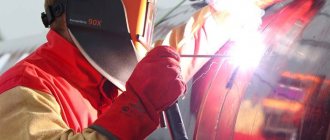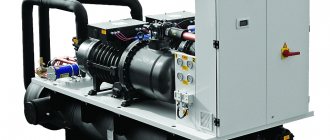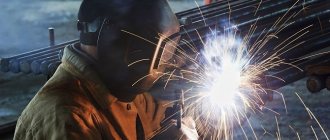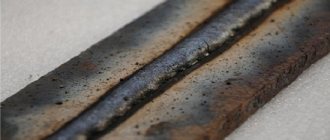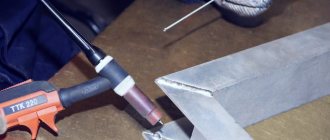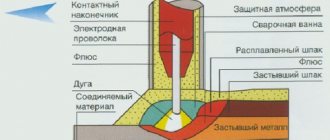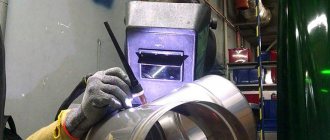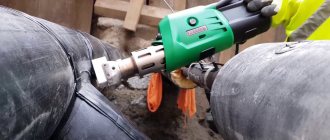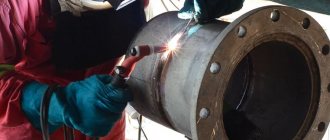Let's talk about a profession that we can't do without at the moment.
And all because we can no longer imagine life without metal structures and everything connected with them. Who is a gas welder, what is the scope of his work, how is this specialist useful, we will tell you the pros and cons of the profession in this article for children looking for their calling. Let's turn to Wikipedia and find out what kind of profession this is. A gas welder is a highly qualified specialist who, using special devices and equipment, connects or disconnects metal parts. In his work, the master uses welding machines, gas shears, pliers and many other auxiliary tools.
Description of the profession
It is worth noting that a gas welder is a narrow specialization that is most often used in construction and industry. There is a shortage of such specialists in the country, which indicates their high demand and the fact that employers especially value these professionals.
In the course of performing tasks from management, the gas welder carries out welding work both individually and as part of a team. But no matter how the work is carried out, each work unit bears responsibility for itself and for its work area.
Gas welder salary level
There is a shortage of qualified gas welders in the Russian labor market, so representatives of this profession can count on a good level of income.
For example, a specialist with no work experience can receive a salary of 20,000 rubles per month. A highly qualified gas welder can earn about 90,000 rubles.
It should also be noted that wages depend on the place of work. For example, the oil refining industry may offer higher salaries than the housing and communal services sector. In addition, gas welders receive additional payments and compensation for harmful activities.
Photo source: Uğur Bozdoğan/pexels
What does he do?
Now let’s discuss what a welder does and what functions are included in his responsibilities:
- Maintains equipment and tools used to perform gas welding work;
- Complies with safety regulations when performing work;
- Before completing the task, checks the operability of the equipment, monitors gas leaks from the cylinder;
- Connects or disconnects parts of metal structures;
- Performs metal cutting;
- Conducts diagnostics of completed seams to determine their tightness.
Features of the profession
The gas welder is tasked with welding or cutting various parts of metal structures.
In this case, the specialist will need to be able to operate the following types of equipment:
- welding torch;
- electrodes;
- tongs;
- use special hoses;
- welding machines operating in automatic or semi-automatic mode.
The welders themselves can work either individually or in a team. In any case, he bears individual responsibility for the completed area of work.
How to become a gas welder
There are several ways in which you can become a gas welder.
Here we list them.
- Based on grades 9 or 11, you can enroll in a vocational school or technical school at a faculty specializing in welding. Here you can choose a narrow specialization as a gas welder and develop in this direction.
- Complete retraining (if you already have a profession) at courses at schools and colleges.
During your training, you will not only be given knowledge, but will also be helped to develop practical skills. Thus, each group of students is assigned an experienced mentor who will help them position their hands correctly and do the work efficiently.
What you need to know about the profession
If quite recently, the most common were only metal structures made monolithic or using joints, now various types and methods of connecting metal parts are being developed. At the same time, the requirements regarding the quality of connections change. In addition, materials and welding or cutting methods change. And a specialist gas welder must know and be able to do all this.
When welding, the principle is used in which molten metal is poured between two parts of the structure being welded, which will serve as a connector.
As a result, a gas welder is a specialist who welds various products made from various types of metal.
Most often you have to cook:
- pipelines;
- various types of metal structures assemblies;
- details of mechanisms;
- bodies of various types of vehicles.
Specialists will be in demand to carry out tasks not only at enterprises specializing in metalworking, but also in mechanical engineering and agriculture. They will be in demand for utility workers and builders.
Requirements for personal qualities
Now let's figure out what kind of people can become successful in the gas welder profession.
Considering that this is physical and very responsible work, the future specialist must meet the following parameters:
- Have excellent physical health and no contraindications for working with welding equipment;
- Be as responsible as possible and not lose sight of a single detail;
- Have good eyesight;
- No shaking hands;
- Be a maximalist and be demanding of yourself and the quality of the work performed.
Personal qualities of the gas welder profession
To perform the job, a specialist must have the following character traits: responsibility, attention to detail, accuracy, diligence, patience, hard work, perseverance in achieving the desired result.
In addition, persons with allergies, bad habits, poor stamina, and poor eyesight cannot be allowed to work. An employer may refuse to work for those who have problems with the heart and lungs, unstable psyche, osteochondrosis, or radiculitis.
Since a gas welder works in heavy production, he must monitor his health and undergo medical examinations.
Pros and cons of the profession
And now about the most interesting thing, about the pros and cons of the gas welder profession. After all, these are the points that are decisive for children when choosing a specialty.
Advantages:
- You can count on rapid career growth, especially if the specialist has gone on to further studies at a university;
- High level of demand for the profession, especially during the construction of new facilities in the north;
- Decent level of remuneration.
Flaws:
Oddly enough, shortcomings in this activity prevail, but this does not make it less popular among students.
- High level of danger to life and health;
- This often involves working outdoors and in adverse environmental conditions;
- Hard physical labor;
- Work in shifts, including at night;
- It is necessary to constantly refresh knowledge in the field of occupational safety and health;
- Work on a rotational basis (north), which means frequent separation from family is possible;
- Chronic diseases may occur.
Classes of the gas welder profession
Gas welders have five qualification levels, where the minimum is the second category, and the maximum is the fifth.
Gas welder 2nd category
carries out preparatory work, equipment testing, as well as simple welding work.
Gas welder 3rd category
carries out work of an average level of complexity, can also work with non-ferrous metal.
Gas welder 4 categories
knows how to work with complex parts and structures made of different alloys, including how to handle non-ferrous metals. Knows how to eliminate identified defects in already processed parts, can do hot straightening of complex structures.
Gas welder 5th category
deals with complex elements made of high-carbon, alloyed, special and corrosion-resistant steels, cast iron, non-ferrous metals and alloys.
Gas welder 6th category
deals with those parts and structures that are intended for subsequent operation under high pressure or loads.
Let's sum it up
We tried to sanctify the professional activity as much as possible, and you found out who the gas welder is. Now you know what its benefits are and what a specialist does. This article is like a guide for children in choosing a future specialty, thanks to which the child will be able to learn about the pros and cons of what they will have to face, after which they can make an informed decision.
And here we must not miss the point that the specialty of a gas welder is the future, because in our country there is still so much unexplored. New gas fields are being discovered, factories and entertainment complexes are being built, where it is impossible to do without the “golden hands” of qualified gas welders.
You may be interested in the article: Who is a gas worker, features of the profession, what does he do?
Where can you learn this profession?
There are several ways to obtain education in this area:
- Studying at a technical school. The duration of training depends on the completion of which class the applicant entered. If after the ninth grade, then 3 years, and if after the eleventh grade, then 2 years;
- Work in a company with training. Large organizations have their own certification commissions, so it is possible to obtain the relevant documents for free.
- There is a third option - online learning. It is not listed because many people doubt its effectiveness, but information about it may be useful. If you enter a search query into Google or Yandex, many options for distance learning will appear. Some offer lessons for beginners, while others offer online courses for those who already have some experience but do not have the proper credentials. Naturally, for a certain monetary reward, the student will be told in detail about what kind of profession this is, how to properly follow safety precautions, as well as the nuances of working with different metals.
Gas welders are divided into qualification levels. They differ in the complexity of the work performed. For example, a specialist of the 1st category prepares equipment and carries out simple operations, and a specialist of the 6th (maximum category) can work with any type of welding and perform tasks in very difficult conditions. To confirm your level of qualifications, you must undergo certification every few years.
§ 6. Gas welder 2nd category
Characteristics of the work . Tack welding of parts and structural products in all spatial positions of the weld. Preparation of joints for welding and cleaning of seams after welding. Preparing gas cylinders for use. Maintenance of portable gas generators. Gas welding of simple parts, assemblies and structures made of carbon steels in the lower and vertical position of the weld. Surfacing of simple parts. Elimination of cavities and cracks by surfacing in simple castings. Heating of structures and parts during straightening.
Must know: the structure and operating principle of serviced gas welding machines, gas generators, oxygen and acetylene cylinders, reducing devices and welding torches; types of welds and joints; rules for preparing simple products for welding; types of sections and designations of welds in drawings; handling rules and basic properties of gases and liquids used in welding; permissible residual gas pressure in cylinders; purpose and brands of fluxes used in welding; causes of defects during welding, characteristics of the gas flame; cylinder paint colors; arrangement of gas supply communications to places of consumption and rules for connecting to them.
Work examples
1. Axle-box, column and center bolts - fusing of excavation areas.
2. Car gas tank necks - soldering.
3. Details of the frames of the side awning - tack welding.
4. Portholes and covers - welding.
5. Cones of oil pumps and car filters - fusing shells in castings.
6. Protective casings - welding.
7. Covers of undercar lighting gutters - welding.
8. Brackets for attaching the muffler to the car frame - welding of cracks.
9. Moldings - welding of ears.
10. Pallets for machines - welding.
11. Reception pipes - welding of safety nets.
12. Car wing reinforcements - welding.
13. Corner sheets of the inner and outer skin of the tram - welding of cuts.
14. Clamps of hydraulic mechanisms of dump trucks - welding.

